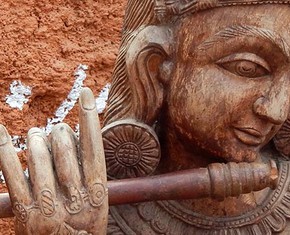The views expressed in our content reflect individual perspectives and do not represent the authoritative views of the Baha'i Faith.
Each age has different requirements, so the teachings of the messengers of God have specific laws and principles best suited for the eras when they appear.
The Baha’i teachings say that these laws and principles change over time as humanity’s condition evolves. Some are purely personal in nature, but many of them affect human interactions. It is essential that these laws be observed in each respective religious dispensation, for they are the expression of God’s will for that time. Obedience to them ensures not only personal salvation but also the collective progress of society.
Today, Baha’is believe that Baha’u’llah has revealed the laws and principles necessary for humanity’s present stage of development.
Among the most essential laws and principles for the modern age—the oneness of God and the oneness of religion, the oneness of humanity, and the equality of women and men.
Baha’u’llah taught that we have now reached the age in which all religions will be reconciled, when all of humanity will gather under the shelter of one faith. He teaches that the religion of God has always been one. Baha’u’llah emphasized the essential unity of all of the messengers of God, even though in each age they revealed what was necessary at that time.
The Baha’i teachings say that each successive stage in religious history has been part of God’s great plan for human salvation—and therefore we should revere all of the prophets. Moreover, everyone should show genuine love and goodwill towards the members of different religions. Baha’u’llah gives the following exhortation: “Consort with the followers of all religions in a spirit of friendliness and fellowship.” – Gleanings from the Writings of Baha’u’llah, p. 95.
Every religion has some version of the Golden Rule. They all teach brotherly love and consideration for others, out of recognition that all people are God’s children and deserve to be treated as we ourselves would wish to be treated.
One of the signs of maturity in any person is the increased capacity to consider the feelings of others and to show them genuine care. Most individuals, as they develop from childhood through adolescence and into adulthood, learn to love other people, such as relatives, friends, and others.
In many cases such love is based upon a sense of reciprocity. We love our friends because they love us. We love our family because of the love they have shown us. We occasionally make sacrifices for others with the understanding that they will do so too, should the need arise. Even when it comes to the larger society, we are often willing to give of ourselves to some extent so that, in due course, we may also benefit in some way.
But the messengers of God teach us that true love—the love born of the Holy Spirit—does not depend upon a sense of reciprocity. Instead, true love is selfless and unconditional. Those who are animated by such unselfish love are indiscriminate— they do not limit their love to certain individuals. Such love seeks neither reward nor recognition. It inspires us to love our enemies as well as our friends, regardless of their feelings for us.
Baha’u’llah taught that human beings should develop true, spiritual love for all humanity. This kind of love, he asserts, derives from our love for God and from our awareness of His love for all humanity.
In certain passages Baha’u’llah explains that the knowledge of self is the same as the knowledge of God, for the soul is the mirror of God’s qualities. It follows, then, that if we truly love God, we must also love all of His children, who are created in His image.
The time has come, the Baha’i teachings say, for the principle of the oneness of humanity to be understood, accepted and applied. This spiritual principle has profound implications for individual life and the ordering of society. True justice and peace can only come about when we universally accept and apply this foundational principle.
To understand and accept the oneness of humanity means that we must fully embrace the notion that all human beings, regardless of race, creed, class, or any other variation of background, are the children of the same divine Father. Prejudices of any kind are unacceptable, as is any behavior that gives unfair advantage to some group or groups at the expense of others.
In Baha’u’llah’s The Hidden Words we find the following verse:
O Children of Men! Know ye not why We created you all from the same dust? That no one should exalt himself over the other. Ponder at all times in your hearts how ye were created. Since We have created you all from one same substance it is incumbent on you to be even as one soul, to walk with the same feet, eat with the same mouth and dwell in the same land, that from your inmost being, by your deeds and actions, the signs of oneness and the essence of detachment may be made manifest. Such is My counsel to you, O concourse of light! Heed ye this counsel that ye may obtain the fruit of holiness from the tree of wondrous glory. – p. 20.
Elsewhere Baha’u’llah stated:
The utterance of God is a lamp, whose light is these words: Ye are the fruits of one tree, and the leaves of one branch. Deal ye one with another with the utmost love and harmony, with friendliness and fellowship. He Who is the Daystar of Truth beareth Me witness! So powerful is the light of unity that it can illuminate the whole earth. The One true God, He Who knoweth all things, Himself testifieth to the truth of these words.
Exert yourselves that ye may attain this transcendent and most sublime station, the station that can insure the protection and security of all mankind. This goal excelleth every other goal, and this aspiration is the monarch of all aspirations. – Epistle to the Son of the Wolf, p. 14.
















Comments
Sign in or create an account
Continue with Googleor